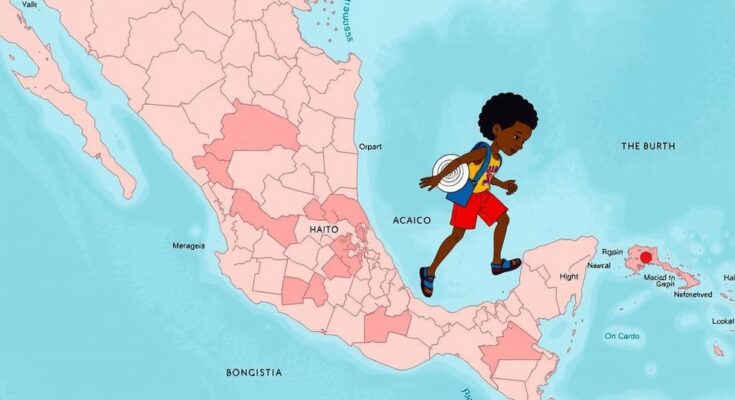Mexico has experienced a dramatic increase in irregular migration, with over 925,000 migrants reported in early 2024, while asylum applications dropped by nearly 44%. The Haitian refugee count stood at 10,853 as systemic issues in the asylum process hinder legitimate attempts to seek refuge. Activists warn of the risks posed by pending U.S. immigration policy changes.
Haiti has witnessed a notable increase in irregular migration, especially toward Mexico, where applications for asylum have seen a significant decline. In 2024, the number of asylum seekers in Mexico dropped to approximately 78,975, marking a reduction of about 44% compared to 2023’s peak of 140,720 applications, according to the Mexican Commission for Refugee Assistance (COMAR). Asylum seekers from Haiti numbered 10,853 in the last year, amidst a landscape where irregular migration surged by 132%. Over 925,000 migrants were identified in irregular circumstances between January and August 2024, mainly concentrated around Tapachula, a city on the border with Central America. Although migration patterns fluctuate, challenges persist due to lengthy processing times which dissuade migrants from applying, prompting many to seek expedited travel to the United States before the potential introduction of stricter immigration policies by the incoming administration of President Donald Trump. Organizations advocating for human rights have voiced concerns about the Mexican government’s lack of effective support for those seeking asylum, even as promises were made to assist those wishing to remain in the country.
Irregular migration has escalated in Mexico, intertwined with broader regional challenges and changes in asylum policies. The declining number of formal asylum requests amid rising irregular crossings illustrates a complex migration landscape shaped by socio-political factors both in migrants’ home countries, like Haiti, and in their destination countries, primarily the United States. COMAR’s reports indicate that although many migrants appear to be foregoing the official asylum process due to inefficient bureaucratic responses, there is an urgent need for humane and effective management of migration to address the humanitarian crises experienced by these populations. This situation is further aggravated by fears of changing immigration policies under future U.S. leadership, spurring migrants to take risks in seeking timely passage to the U.S.
In summary, while asylum applications in Mexico have noticeably decreased, irregular migration has surged to unprecedented levels. This paradox highlights the urgent need for a more responsive immigration system capable of addressing the complexities faced by migrants. Concerns raised by human rights advocates underline the importance of providing adequate support to individuals navigating these precarious circumstances. The forthcoming changes in U.S. immigration policy could further influence migration trends from Haiti and other countries in the region, reinforcing the necessity for effective governance and protection mechanisms.
Original Source: www.haitilibre.com




